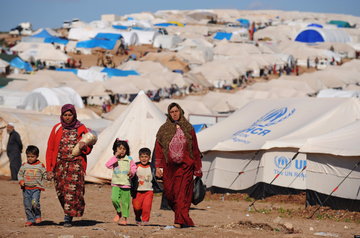#AleppoCrisis: Including Women For Building Lives And Countries
I recently read a powerful piece on the humanitarian crisis in Aleppo and the things we can do to help.
What tore at the heart was the accompanying picture of a young mother in despair, with her hand on her heart. It was both deeply distressing and a call to the world’s conscience.
These stories have been played out in so many parts of the world, and the ongoing conflict in Syria brings it to the fore again.
The men fight and families are torn apart but it is the women who bear the brunt - as the chief architects of the home and the building blocks of sane and civilized societies.
While crises are gender neutral, women suffer the most as their role and responsibilities are magnified while the resources to fulfill them shrink. Humanitarian aid focuses on survival needs.
The Humanitarian Mess
International organizations have started taking note of the different needs of all the groups in the refugee community.
With health, food and sanitation as the primary areas of focus, getting the emphasis on mental health and counselling is understandably difficult. The more creative among the agencies are focusing on safety mapping of community resources to minimize violence. There is also an emphasis on moving away from simply reacting to crises as they emerge and, embracing a pre-emptive approach that promotes prevention, preparedness and resilience.
The Search For Answers
The UNOCHA report quotes a telling incident during the food crisis that gripped Africa. A farm woman told the aid workers that she could see the crisis coming a long time ago, “But who bothered to listen to us women?’’
Humanitarian efforts consistently fail to engage and include women in plans and efforts targeted at them.
In the process they lose out on women’s innate knowledge of the community, their resilience and their capacity for leadership in times of adversity. All these capabilities can help rebuild and rehabilitate communities.
Sadly the focus is on donations and aid to help them through. While essential in the immediate context, this emphasis on exclusive solutions imposed from above, does nothing to build the fractured psyche or ensure dignified engagement.
Quite simply, the need is to address the barriers to greater participation and harness their ability to mobilize themselves in a self sustaining way through education and skill building.
Think of projects like ‘Olive Tree Women’s Craft Collective by Small Projects Istanbul and Drop earrings Not Bombs. This creative therapy does more than generate income. It facilitates hope and dignity to lost lives and provides cross cultural connections.- Knitting, Sewing and Weaving an Independent Life.
I remember an aunt who survived the great refugee tide during the Partition of India in the 1940’s. She spoke of how living on food donations and aid crippled her self esteem and going out to volunteer in the Community kitchen brought a sense of worth that helped her deal with the trauma.
Looking For Innovative Solutions
The case is for a need to build alternate programmes into humanitarian relief work. I can see organizations partner with agencies that specialize in assisting in skill building or have resources to bring on board agencies that do.
Even though each crisis has its own unique pitfalls,a resource Centre, that can provide a framework to build solutions according to the nature of crisis, can be put together.
This also means that the humanitarian and development community has to address the issue of remote work options and opportunities that can enable women to be engaged and provide options that can sustain and bring monetary benefit.
A woman with greater self worth will be able to bring better solutions within the family and community. Bringing aboard more agencies that provide training in entrepreneurship, innovation and organization, as bench resources, is another option.
The Way Forward
The way forward is to develop the intent to create value out of a hopeless situation. To view the women in the refugee crisis as the game changers, who are able to draw on reserves and inner resources, to develop skills, to rebuild life, worth and become a participative force in the community, within the framework of cultural ethos.
The humanitarian effort needs to develop a focus on women as the main participative force capable of novel solutions.












